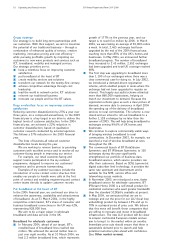BT 2004 Annual Report Download - page 20
Download and view the complete annual report
Please find page 20 of the 2004 BT annual report below. You can navigate through the pages in the report by either clicking on the pages listed below, or by using the keyword search tool below to find specific information within the annual report.status of the UK market review programme and its
implications for and effects on BT are summarised
below.
Narrowband market reviews
Five reviews of narrowband markets were concluded in
November 2003. In four of these reviews, BT was
found to have SMP in some or all of the markets
concerned, and conditions were imposed accordingly,
including price controls (see Pricing regulation), non-
discrimination, publication of charges, terms and
conditions, and the publication of a ‘‘Reference Offer’’
in relation to access services. While many of these
obligations are similar in scope of application and
severity to those which applied under the old
regulatory regime, a number of changes have been
introduced. Some of these are favourable to BT. For
example, BT is no longer subject to SMP conditions in
retail international calls made by business customers or
in wholesale international services on country routes
accounting for 95% of call volumes. In addition, BT
was found not to have SMP in markets for wholesale
unmetered narrowband internet termination. However,
these reviews also produced some outcomes less
favourable to BT: for example, Oftel’s proposal to
require us to provide digital wholesale line rental
products was confirmed.
Leased lines market review
In December 2003, Oftel published its second draft
Leased Lines Market Review (LLMR). Among other
things, this continued the obligation to provide cost-
oriented partial private circuits (PPCs) as a wholesale
alternative to retail private circuits, or leased lines. The
draft LLMR also required a further effective price
reduction of RPI-7%, to take effect from August 2003.
We are working with Ofcom to agree a forward-looking
price control for PPCs.
The LLMR included a new requirement to provide
a wholesale variant of BT’s retail ethernet-interface
leased line services. We were already in negotiation
with wholesale customers for provision of a wholesale
product and these commercial negotiations will be
guided by our regulatory obligations.
Wholesale broadband access market review
The consultation period on this market review closed
on 6 February 2004, and the publication of Ofcom’s
final decisions is awaited. In the consultation
document, Ofcom proposed that BT has SMP in
markets for wholesale broadband origination and
conveyance, and set out plans to impose a full range of
SMP obligations.
BT is required to pass margin squeeze tests in
advance of any price change on some of the wholesale
products in our broadband portfolio. Margin squeeze
tests are designed to address a particular risk where a
company with market power upstream is vertically
integrated and sells an upstream input both to its own
downstream operation and also to its downstream
competitors. The test is to determine whether the
company would be profitable in the downstream
market if it had to pay the same price for the upstream
input as its downstream competitors. This Direction
has been continued pending completion of the market
review, and margin squeeze tests are likely to appear
as regulatory remedies in the event that BT is found to
have SMP in broadband access.
On 3 April 2003, Oftel began an investigation into
BT’s proposed price change of the IPStream products,
on the grounds that there might be a margin squeeze
on the Datastream products (regarded by Ofcom as
the upstream product). We agreed voluntarily to
reduce the corresponding Datastream prices and, in
May 2004, announced our intention to further adjust
the prices to ensure there are adequate margins
between Datastream and IPStream Home 500 (see
Traditional services for wholesale customers).
Other market reviews
Ofcom is conducting a market review of local loop
unbundling (LLU) and, in May 2004, published the first
consultation. A second will take place during the
summer, with completion anticipated for December
2004.
On the mobile front, Oftel concluded a market
review of mobile access and origination in November
2003, and a final statement is awaited from Ofcom on
the review of mobile voice termination.
Ofcom published a consultation document on
financial reporting in April 2004. This makes proposals
for SMP obligations relating to accounting separation
and cost accounting systems across all markets where
SMP designations have been made.
SMP apparatus conditions
The Government has made provision in the
Communications Act for Ofcom to review markets for
terminal apparatus (eg telephones) and impose
conditions on accounting methods, systems and
separation, and to impose price controls in relation to
hard-wired phones on any provider designated with
SMP. Ofcom is considering whether to conduct a
review of hard-wired telephones.
Enforcement
The Communications Act sets out the enforcement
process to be followed in relation to breaches of
conditions. Where a breach is not remedied following
notification by Ofcom, Ofcom may take legally
enforceable enforcement action and/or impose a
penalty of up to 10% of relevant turnover. In addition,
a person who suffers loss or damage as a result of the
breach may, with Ofcom’s consent, sue for damages,
and, in the case of serious and repeated
contraventions, Ofcom may restrict or suspend the
provider’s entitlement to provide electronic
communications networks or services.
The Communications Act contains similar
enforcement procedures (though with much smaller
penalties) for matters such as non-compliance with a
request for information or non-payment of an
administrative charge.
19 Operating and financial review BT Annual Report and Form 20-F 2004
























